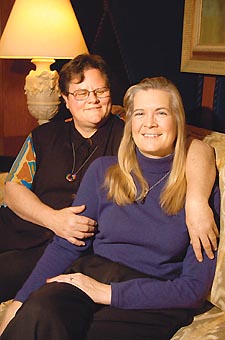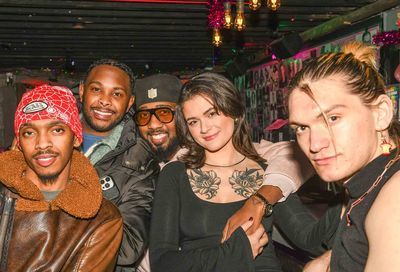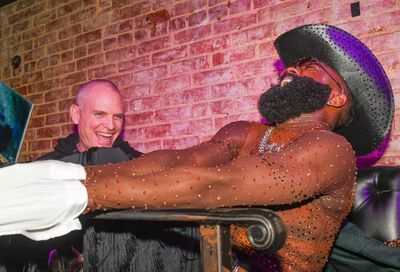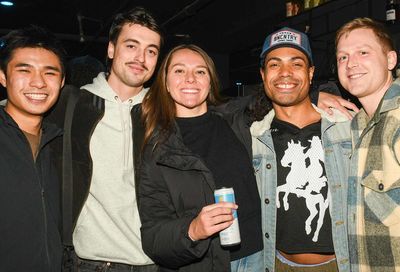Thirty years later and they still make each other laugh. As Kathleen DeBold and Barbara Johnson, both 49, tell the tale of how they met as teenagers on a Florida college campus in the early 1970s, they joke and tease and crack each other up with ease.
It all dates back to Dec. 1, 1974, when, Johnson says, “We admitted we loved each other.”
“We’d already been busy,” DeBold grins.
The teenage lovebirds met at Flagler College in St. Augustine, Fla., which they both had chosen to attend based on fliers they had spotted in their respective high school counselors’ offices.
“We called it ‘Fagler,'” DeBold says. “It was all theater, arts and women’s sports.”

Kathleen DeBold and Barbara Johnson |
As English majors, they both shared many classes, and over their freshman year became close. Barbara had begun the discovery of her sexuality while hanging out in gay bars with gay male friends — and there meeting a Navy woman who got things rolling. Kathleen, on the other hand, was essentially always out, having been “a tomboy type.”
But they didn’t completely admit their feelings for each other that first year. When they returned from summer break, Barbara had expected things to pick up exactly where they left off. But Kathleen was mad about the sailor Barbara had met, and avoided contact with Barbara.
“So I was just pining,” she says, watching Kathleen’s dorm room from her own room’s window.
It wasn’t until Kathleen heard from a mutual friend that Barbara had gone out in frustration to try to meet up with the aforementioned sailor that the two had a heart to heart.
“Kathleen said, ‘I love you,” Johnson says. “When she asked me if I felt the same I said, ‘I think so.’ I didn’t want to scare her off.”
Although they were finally able to declare their love, the reception to their relationship wasn’t positive. Johnson lost her scholarship.
While there were many lesbians at the school, DeBold says, a great many of them were in the athletic program and closeted.
“They didn’t like it when people were out,” she says.
They left Flagler behind to return to Maryland, where they had both been raised. Johnson’s parents “freaked out” about the relationship, but never forbade them from seeing each other. At one point, her parents set up a meeting with DeBold’s parents. When they got together, the assembled adults told the two madly-in-love girls to go upstairs and wait in Barbara’s room. DeBold laughs at the cluelessness of the straight parents.
“What did they think was going to happen?” she grins.
Setting out on a relationship during a time when role models were scarce, they both delved into the gay and lesbian community’s history to find what models and examples there were. In particular, they spent a lot of time in the women’s movement.
The most profound impact on the growth of their relationship came with DeBold’s decision to join the Peace Corps in the early 1980s, which sent her to Africa for most of the decade.
“It forced me to grow up,” Johnson says. “I had been codependent.”
They weren’t sure if their relationship would survive the separation, but they maintained a passionate correspondence and managed to see each other in a handful of cherished visits.
DeBold returned in 1989, and this time they did pick up where they left off, although it wasn’t easy. Years of working in impoverished communities left DeBold frustrated with the consumer-oriented ways of 1980s America.
That was when DeBold decided to get involved in gay and lesbian activism, a path that led her to the Victory Fund and her current position heading up the Mautner Project for Lesbian Health. Johnson’s own path has led to her recent nomination for a Lambda Literary award for her writing in Once Upon a Dyke.
The success of their relationship lies in “trying not to take each other for granted,” says DeBold. “We try to be aware of how lucky we are.”
Monday night is date night, which cannot be missed, as even their coworkers have learned when work tries to intrude. And they always have something outside their house.
“It keeps it special,” DeBold says.
The time they spent apart also gave them much of the strength they needed to stay together as a couple.
“We grew up as individuals when we were apart,” Johnson says. “If you have interests that are separate, you have to maintain those interests. If you have to give it up you resent it.”
“We do share so much, though, and that helps,” DeBold says. “It’s easier when you’re really in love. That, and the mindblowing sex.”
Pause.
“Sometimes with each other.”
Laughter.
So what’s kept them in love with each other for 30 years, two months, and a handful of days?
“I just love her so much,” Johnson says. “I just can’t imagine being with someone else. I can’t imagine that anyone else would fulfill so much.”
“I think it’s the same thing,” DeBold says. “It’s just being so happy.”
Pause.
“But I still think it’s the mindblowing sex.”
























